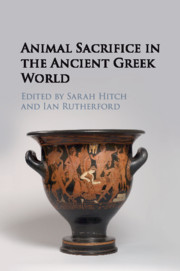Refine search
Actions for selected content:
23989 results in Ancient history
Chapter 3 - Scriptural Exercises and the Monastic Soundscape
- from Part II - Cognitive Disciplines
-
- Book:
- Monasteries and the Care of Souls in Late Antique Christianity
- Published online:
- 30 August 2017
- Print publication:
- 07 September 2017, pp 110-147
-
- Chapter
- Export citation
Chapter Ten - Conclusion
-
- Book:
- Cultural Identity in Minoan Crete
- Published online:
- 21 September 2017
- Print publication:
- 07 September 2017, pp 209-229
-
- Chapter
- Export citation
Index Locorum
-
- Book:
- Monasteries and the Care of Souls in Late Antique Christianity
- Published online:
- 30 August 2017
- Print publication:
- 07 September 2017, pp 329-340
-
- Chapter
- Export citation
Contents
-
- Book:
- Cultural Identity in Minoan Crete
- Published online:
- 21 September 2017
- Print publication:
- 07 September 2017, pp i-iv
-
- Chapter
- Export citation
Chapter Two - The Background to Neopalatial Crete
-
- Book:
- Cultural Identity in Minoan Crete
- Published online:
- 21 September 2017
- Print publication:
- 07 September 2017, pp 1-16
-
- Chapter
- Export citation
Abbreviations
-
- Book:
- Monasteries and the Care of Souls in Late Antique Christianity
- Published online:
- 30 August 2017
- Print publication:
- 07 September 2017, pp xi-xii
-
- Chapter
- Export citation
Figures
-
- Book:
- Cultural Identity in Minoan Crete
- Published online:
- 21 September 2017
- Print publication:
- 07 September 2017, pp v-viii
-
- Chapter
- Export citation
Notes
-
- Book:
- Cultural Identity in Minoan Crete
- Published online:
- 21 September 2017
- Print publication:
- 07 September 2017, pp 230-239
-
- Chapter
- Export citation

Animal Sacrifice in the Ancient Greek World
-
- Published online:
- 31 August 2017
- Print publication:
- 24 August 2017
2 - Days in the Lives of Schoolchildren
-
- Book:
- Stories of Daily Life from the Roman World
- Published online:
- 06 August 2018
- Print publication:
- 31 August 2017, pp 7-47
-
- Chapter
- Export citation
5 - Why Choose to Come Together and Move Apart?
- from Part II
-
- Book:
- Migration, Mobility and Place in Ancient Italy
- Published online:
- 30 August 2017
- Print publication:
- 31 August 2017, pp 139-188
-
- Chapter
- Export citation
Index
-
- Book:
- Migration, Mobility and Place in Ancient Italy
- Published online:
- 30 August 2017
- Print publication:
- 31 August 2017, pp 504-521
-
- Chapter
- Export citation
9 - Social War: Reconciling Differences of Place and Citizenship
- from Part IV
-
- Book:
- Migration, Mobility and Place in Ancient Italy
- Published online:
- 30 August 2017
- Print publication:
- 31 August 2017, pp 311-359
-
- Chapter
- Export citation
Appendix B - Homecoming and Hospitality Greeting Scenes
-
- Book:
- Migration, Mobility and Place in Ancient Italy
- Published online:
- 30 August 2017
- Print publication:
- 31 August 2017, pp 428-429
-
- Chapter
- Export citation
Contents
-
- Book:
- Migration, Mobility and Place in Ancient Italy
- Published online:
- 30 August 2017
- Print publication:
- 31 August 2017, pp vii-ix
-
- Chapter
- Export citation
7 - Polybius on Mobility and a Comedy of The Hostage Prince
- from Part III
-
- Book:
- Migration, Mobility and Place in Ancient Italy
- Published online:
- 30 August 2017
- Print publication:
- 31 August 2017, pp 229-266
-
- Chapter
- Export citation
3 - Let's Go to Court
-
- Book:
- Stories of Daily Life from the Roman World
- Published online:
- 06 August 2018
- Print publication:
- 31 August 2017, pp 48-57
-
- Chapter
- Export citation
11 - Passages Providing Additional Context for the Colloquia
-
- Book:
- Stories of Daily Life from the Roman World
- Published online:
- 06 August 2018
- Print publication:
- 31 August 2017, pp 115-132
-
- Chapter
- Export citation
Contents
-
- Book:
- Stories of Daily Life from the Roman World
- Published online:
- 06 August 2018
- Print publication:
- 31 August 2017, pp vii-ix
-
- Chapter
- Export citation
12 - Further Information about the Colloquia
-
- Book:
- Stories of Daily Life from the Roman World
- Published online:
- 06 August 2018
- Print publication:
- 31 August 2017, pp 133-153
-
- Chapter
- Export citation
